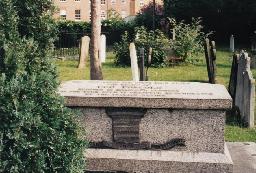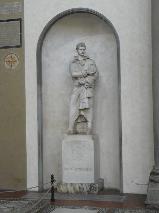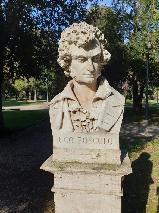Foscolo, Ugo |
| POET, WRITER, REVOLUTIONARY (ITALY) |
|
BORN 6 Feb 1778, Zakynthos, Ionian Islands - DIED 10 Oct 1827, London: Turnham Green BIRTH NAME Foscolo, Niccolò GRAVE LOCATION Firenze, Toscana: Santa Croce, Piazza Santa Croce |
|
Ugo Foscolo was born in Zakynthos, then part of the republic of Venice. His father Andrea Foscolo was a poor Venetian nobleman and his mother Diamantina Spathis was Greek. His father worked as a a physician in Spalato (now Split) and when he died in 1788 the famuly moved to Venice. He entered Padua University, where his teacher Abbé Melchiore Cesarotti influenced his literary development. He was active in political committees and in favour of replacing the Venetian republic by a new free republic. In 1797 the Republic of Venice was disbanded, but it was divided by the French and the Austrians. He reacts on this in his novel "The Last Letters of Jacopo Ortis" (1798). He moved to Milan, where he befriended the poet Giuseppe Parini. He volunteered in the French army and he was wounded. He served under Massena during the defense of Genoa in 1800 and when the city surrendered he followed Massena in flight. He went to France in 1804 for military reasons. There he had several love affairs, including the one with Fanny Emerytt that resulted in a daughter, Floriana. After two years he returned to Italy. In 1807 he wrote his best known poem "Dei Sepolcri". In 1809 he became professor of chair of Italian eloquence at Pavia University. But his inaugural lecture contributed to Napoleon's abolishment of the chair of national eloquence in all universities in Italy. In 1811 his tragedy "Aiace" (1811) was staged in Milan, but its anti-French elements forced him to relocate to Florence. There he finished his translation of Laurence Sterne's "Sentimental Journey" and he wrote his tragedy "Ricciarda". In 1813 he returned to Milan, but when the Austrians entered the city he moved to Zurich in 1815 to avoid to swear loyalto t othem. In 1816 he went to London. There he was well respected because of his political and literary reputation. He wrote in Italian on Dante and Boccaccio and in English on Petrarch. His writings earned him a decent income and he started to build a villa. But he spent far too much money and even financial support by Floriana could not help him escape the debtor's prison. His reputation was damaged and London was also tired of his stories. He retired to Turnham Green where he lived with his daughter. Walter Scott later wrote in 1825 in his diary about Foscolo's bad manners in society. Foscolo died in Turnham Green in 1827 and he was buried at St. Nicholas' Churchyard in Chiswick. In 1871 his remains were exhumed and reburied in the Santa Croce church in Florence. Related persons • was a friend of Costa, Paolo • corresponded with Lamb, Caroline • was a friend of Panizzi, Anthony |
| Images |
Sources • Ugo Foscolo - Wikipedia (EN) |





